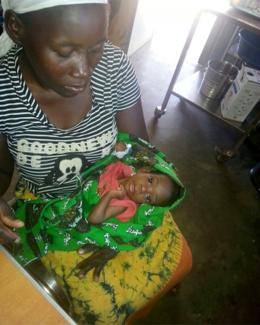At just ten months old, Jamila Yacumbe was diagnosed by health workers at Angoche Rural Hospital in Mozambique with severe acute malnutrition. She weighed 3.1 kg, or 6.8 lbs, and had no appetite to help her put on additional weight. Her mother, Mariamo Yacumbe, worried for her daughter’s health and survival. Health staff advised that Jamila be admitted to the hospital for many days to receive specialized treatment for her severe acute malnutrition. This meant that Mariamo would also need to stay in the hospital with Jamila until she had recovered. Yet, that would pull Mariamo away from home—and her other children—while Jamila received treatment. Inpatient costs for her daughter and the strain of being away from caring for the rest of her family was too high a price for her to consider.
This challenge of household responsibilities competing with health needs is common among vulnerable populations; the cost, time, and burden to travel to the facility are frequent barriers that prevent parents and caregivers from pursuing care for their children. USAID works to address these critical barriers to health access by training health staff to appropriately counsel and support caregivers. This helps children access and benefit from the Government supported health system, including by accessing necessary treatments for malnutrition. Health staff are also taught how to counsel caregivers on improved nutrition to ensure malnourished children continue to thrive well beyond their hospital stay.
Through counseling with USAID-trained health workers at Agoche Rural Hospital, Mariamo was able to find a solution to her challenge. Mariamo would bring Jamila to the hospital’s at-risk child clinic one day per week, and the clinic would give Mariamo energy-dense therapeutic food to feed at home, so Jamila would receive all the nutrients she needed. Mariamo was able to spend most of the week at home caring for her other children and maintaining her household. In just four weeks, Jamila had successfully recovered. Weekly nutrition counseling with health workers also taught Mariamo how to feed her children frequent, diverse and nutritious meals to ensure that her none of them ever become malnourished again.
The Government of Mozambique is committed to reducing malnutrition among children under 5, and in 2017 USAID support helped trained nearly 11,000 health workers on nutrition, including improved malnutrition prevention, detection, counseling and support.
Through these efforts, USAID is enhancing the Government of Mozambique’s ability to provide its citizens with critical nutrition services, leading to healthier and stronger families, and a strong country. This effort improves service capacity, expands population coverage, and improves financial protection. By strengthening local capacity, USAID builds responsive health systems and supports Mozambique on its journey to self-reliance.
Download the PDF version of this story. [PDF, 225K]

Ines Natercia P Roxa
